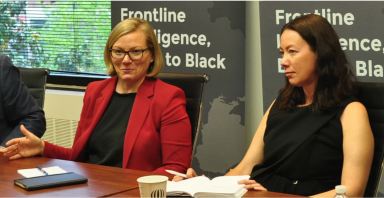In the weeks leading up to the 2018 NATO Summit, several Estonian officials have been through Washington to share their views on NATO’s priorities and outcomes for the summit. They have included Ambassador to NATO Kyllike Sillaste-Elling, Ministry of Defense Permanent Secretary Jonatan Vseviov, Parliament Foreign Affairs Committee Chair Marko Mihkelson, head of NATO’s Cyber Defence Section Christian Lifländer, and International Centre for Defence and Security (ICDS) Director Sven Sakkov. Their overwhelming consensus called for a clear affirmation of transatlantic unity and commitment to the democratic values on which the alliance was founded.

EANC meeting with Estonian Foreign Affairs Committee members. From left: Committee Member Henn Põlluaas, EANC’s Karin Shuey, EANC President Marju Rink-Abel, Committee Member Maire Aunaste, Committee Chair Marko Mihkelson, Committee Member Barbi Pilvre, Estonian Ambassador to the U.S. Lauri Lepik, JBANC Managing Director Karl Altau. Photo credit: Embassy of Estonia
The main topics of the summit will likely include burden-sharing, or meeting the 2% of gross domestic product benchmark for defense spending reaffirmed at the Wales summit in 2014; cooperation between NATO and the European Union; and streamlining NATO’s command structure to be more efficient in responding to threats. While past summits have had some focus on the Baltic region, this one may not put Estonia and its neighbors in the spotlight.
Nonetheless, Estonia has been a NATO success story. It has been meeting the 2% goal since 2013. The Enhanced Forward Presence (EFP) mission to deter Russian military aggression “has become part of the furniture” according to Ambassador Sillaste-Elling, indicating seamless cooperation among the British, French and Danish forces stationed in Estonia and their host nation’s troops. Estonia continues to be a leader in cyber defense. Mr. Lifländer stated that cyber attacks are “becoming more common but not necessarily more sophisticated” as defense against them has evolved from a “technical phenomenon to part and parcel of what we do.” Secretary Vseviov cited the success of EFP and the speed of its implementation from planning stages in the fall of 2016 to boots on the ground in April 2017. He also commended the first-ever cyber tabletop exercise in Tallinn, where EU defense minsters learned the strategic-level implications of responding to cyber threats. NATO and EU cooperation are critical when such challenges arise.

Center for European Policy Analysis (CEPA) strategy session with Estonia’s Ambassador to NATO Kyllike Sillaste-Elling and Deputy Chief of Mission to the U.S. Marki Tihhonova-Kreek. Photo credit: CEPA
Estonia has also made good use of its allocation from European Deterrence Initiative funding by enhancing its infrastructure to host allied forces and increasing its own defensive capabilities. The National Defense Authorization Act (NDAA) for 2019 allocates $6.3 billion to deter Russian aggression in Europe under the European Deterrence Initiative and Estonia will likely get a portion to continue improving its forces.
Several challenges remain in the region, as identified by these leaders during their meetings. One important point is that deterrence is a process, not an end state. While the EFP presence is a good start in addressing land-based threats, the deterrence mission needs to evolve and keep pace with air- and sea-based aggression, as well. Mr. Sakkov

Presentation on Capitol Hill of ICDS report on the status of Baltic air defense. From left: Estonian Embassy Political Affairs Secretary Kristjan Kuurme, ICDS Director Sven Sakkov, report co-author Sir Christopher Harper, Estonian Foreign Affairs Committee Chair Marko Mihkelson. Photo credit: Karin Shuey
and ICDS recently released a report concluding that air defense “is the biggest military capability gap in the [Baltic] region, and while the three states have taken steps to address this, the full range of systems required…is prohibitively expensive” for their defense budgets. Overcoming the logistics and administrative efforts involved in moving troops and equipment across borders is another critical challenge.
But the most critical overarching need is for the alliance to remain unified in its purpose and commitment to a Europe whole, free and at peace. Without unity, the finer points are moot. The summit will take place July 11-12 in Brussels; EANC will monitor the meetings and report on the most relevant outcomes from an Estonian American perspective.
